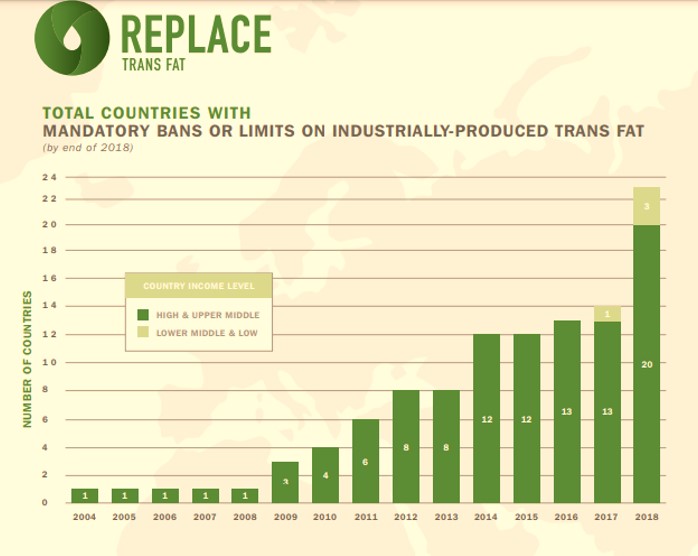
India joins other nations to eliminate trans fats by 2022
We all should avoid consuming trans fats as much as possible. Trans fats are known to have bad impact on health and especially for heart. Eating trans fats rich food results in increase in bad or LDL cholesterol and we can end up in getting heart disease. For this reason, many countries does not permit use of trans fats in food preparation. Most of the trans fat in foods that we eat are formed through manufacturing process that adds hydrogen to vegetable oil. This converts the liquid to solid fat and the process called hydrogenation.
Sometimes in the label we might see the word “partially hydrogenated oils”. This also refers to trans fats. Artificial trans fats usage in processed foods enhances texture, shelf life and flavor of the food that attracts consumers. When you look at the food label you might notice “o gram trans fat”. If the label says 0 gram tans fat, it does not necessarily mean the product does not have trans fats. It might contain up to half gram of trans fats per serving. Countries like USA, Brazil, Canada have taken step to remove trans fats from processed food long back. Now, India has taken step towards eliminating PHO (partially hydrogenated oils) from processed food by 2022. Recently FSSAI has released statement regarding this (Healthy Life)
Another step towards – India@75: Freedom from trans fats by 2022
New Delhi, February 08, 2021: With gazette of recent regulation to limit the content of trans fats in all food items, the Food Safety and Standards Authority of India (FSSAI) joins the league of several other nations globally having best practice policies for trans fat elimination.
With enactment of recent regulations on trans fats, India joins the club of around 40 countries globally that have already enacted the best practice policies to eliminate trans fats and would be among the first countries in Asia after Thailand in achieving the best-practice policies in trans fat elimination.

Key pointers under the regulations:
Limiting industrial TFA to not more than 3% in all fats and oils by January 2021 and not more than 2% by January, 2022, gazette in December 2020.
All food products in which edible oils and fats are used as an ingredient shall not contain industrial trans fatty acids more than 2% by mass of the total oils/fats present in the product, on and from 01st January, 2022 as per the regulation, Food Safety and Standards (Prohibition and Restrictions on Sales) Second
Amendment Regulations, 2021 gazetted in February 2021:
Defines “Industrial trans fatty acids (iTFAs) as – all the geometrical isomers of monounsaturated and
polyunsaturated fatty acids having non-conjugated, interrupted by at least one methylene group, carboncarbon double bonds in the trans configuration. It excludes trans-fatty acids from dairy, meat, fish and their products.”
Industrial trans fats are produced by adding hydrogen to liquid vegetable oils to make them solid, which increases their stability at room temperature and extends shelf life. Trans fats are largely present in partially hydrogenated vegetable fats/oils, vanaspati, margarine and bakery shortenings, and can be found in baked and fried foods.
Research has shown that higher intakes of industrially produced trans fatty acids (>1% of total energy intake) are associated with increased risk of high cholesterol and heart diseases. According to 2017 estimates, every year more than 1.5 million deaths in India is attributed to coronary heart disease, of which nearly 5% (71,000) are due to trans fats intake Elimination of iTFA has been recognized as one the modifiable risk factors to prevent heart diseases. This is especially important in the present scenario, when COVID -19 is adding risk to people suffering from comorbidities like hypertension, heart diseases, diabetes etc. In 2018, WHO called for elimination of industrially-produced trans fat from the food supply by 2023 and released an action package ‘REPLACE’ for the same.
To facilitate the transition towards a Trans Fatty Acids free food supply, FSSAI is also building capacities of the industry and in this regard, recently concluded a series of webinars on trans fats. Each webinar was planned to target specific stakeholders focusing on challenges faced by them towards making a shift to trans fat free products and suggesting practical technological solutions through talks delivered by national and international experts. The webinars were attended by nearly 3,700 participants from the edible oil industry, food businesses, bakers, chefs, restaurateur and hoteliers, sweet and namkeen manufacturers, food analysts from food analytical laboratories and academic institutions.
Press release: https://fssai.gov.in/upload/press_release/2021/02/6023b317a99acPress_Release_Trans_Fat_10_02_2021.pdf
For further read: https://www.who.int/docs/default-source/documents/replace-transfats/replace-act-information-sheet.pdf
Image credit: Image by mscoeraeliey from Pixabay (Free for commercial use)
Author: Sumana Rao | Posted on: March 18, 2021
« Twelve Most Toxic Fruits And Vegetables To Consume WHO: Nutrition and Food Recommendation for Adults Post Covid-19 Recovery »






















Write a comment